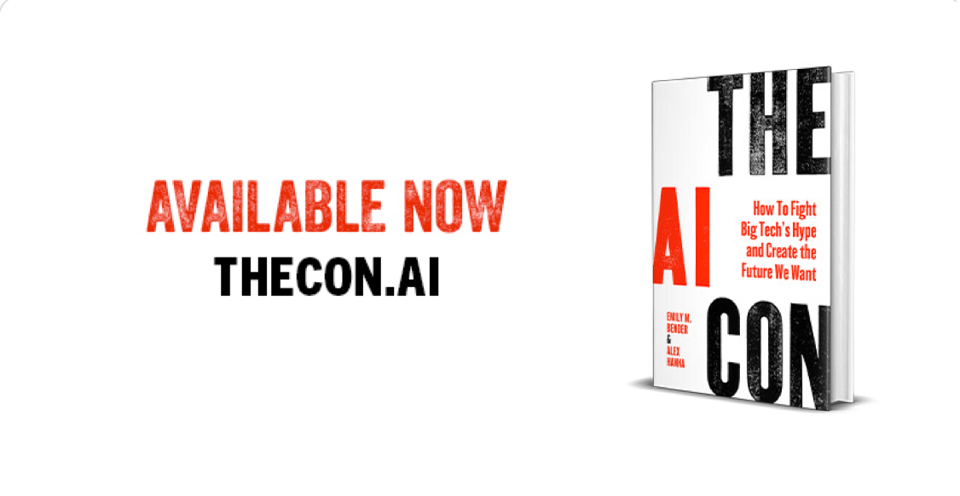Correcting the Record
By Emily
Objecting to my words being used to create AI hype
I have a lot of respect for the craft of journalism and the work of serious journalists. It has been a privilege to get to see some of this work up close over the past few years as media attention has turned to "AI" and I have had the opportunity to be interviewed---often by journalists seeking a clearer understanding of what's going on in this flood of hype. I am generally happy to take the time to talk to journalists, not least because I see public scholarship as part of my job and value the opportunity to help get clearer, better information out to the public.
However, sometimes I end up getting misquoted and my words, intended to help dispel AI hype, get turned into the very kind of hype I am working against. This is extremely frustrating.
A case in point: I was interviewed by Pádraig Belton, writing for the BBC, back in May for a piece on "AI" recipes. It seemed liked a chance to connect with people who might not otherwise follow tech news. We talked about people using chatbots to generate recipes, and I did my best to explain what the chatbots are actually doing: churning through text collected indiscriminately from the internet and other sources, including things like recipe blogs that represent the work of people, and then outputting likely sequences of words.
I also talked some about how you might go about designing a computer program based on databases of recipes specifically with structured data representations of types of ingredients to create a system purpose-built for generating recipe ideas.
My goal here was to demystify ChatGPT and the like, puncture the hype, and provide the journalist (and thus the public) with better ways of thinking about these systems.
So it was extremely disappointing to find my words twisted into AI hype, when the article went live. Take a close look at what's a direct quote in what is attributed to me and what the journalist (or maybe the editor) had to add in order to make it fit their narrative and their understanding of what "AI" is:
![Screencap from linked article (in case they do edit it), reading: However, Prof Bender does concede that in the future more sophisticated AI may be helpful in recipe creation. She says that the AI could be asked to "categorise ingredients as sweet, or acidic, and so on", find those that the internet says should taste good together, and then come up with endless detailed recipes. "However, you have to have a well-defined research question [to give the AI] to get that kind of benefit," she adds. Highlighted with purple underline: "in the future more sophisticated AI" and "[to give the AI]"](https://assets.buttondown.email/images/1a40d76b-42b4-4991-a65d-a1d5b3224d44.png?w=960&fit=max)
The point about the theft of people's labor does come through here, for which I am grateful. But I never talk about "AI" as if it is a thing, nor about these systems "learning" and "reading".
It gets worse though:
![Screencap from linked article (in case they do edit it), reading: However, Prof Bender does concede that in the future more sophisticated AI may be helpful in recipe creation. She says that the AI could be asked to "categorise ingredients as sweet, or acidic, and so on", find those that the internet says should taste good together, and then come up with endless detailed recipes. "However, you have to have a well-defined research question [to give the AI] to get that kind of benefit," she adds. Highlighted with purple underline: "in the future more sophisticated AI" and "[to give the AI]"](https://assets.buttondown.email/images/9335fa45-3b1d-4c95-ba5c-a8c0dd9e3a9b.png)
I concede nothing of the sort. I don't describe these systems as AI, nor as sophisticated, nor do I buy into the AI hype trope of constant appeals to a future with "more sophisticated" versions of these systems.
And under no circumstances would I ever talk about giving an "AI" a research question. I was talking about the research question that a hypothetical scientist or engineer seeking to make an automated recipe generation system would be pursuing in working on that system.
But apparently AI hype has so deeply infected this journalist (or the editor) that they could not understand what I actually said. Instead, they had to put words in my mouth---literally insert them into the middle of a direct quote---to make it seem as if I was saying what they wanted me to say.
So, to readers of the BBC and any other journalistic outfit: be sensistive when experts are quoted to what's actually attributed as words that they said, and what's in the journalist's voice. If the journalist has to add something to a quote in square brackets, it could be that they're accurately replacing a pronoun with what it refers back to. Or, like in this case, they could be inserting literally anything.
And journalists: I will keep talking to you (especially if I see evidence of prior serious reporting you've done on this topic). But if you misquote me, and twist my words to turn them into AI hype, then I will push back and correct the record as publicly and as loudly as I can.
